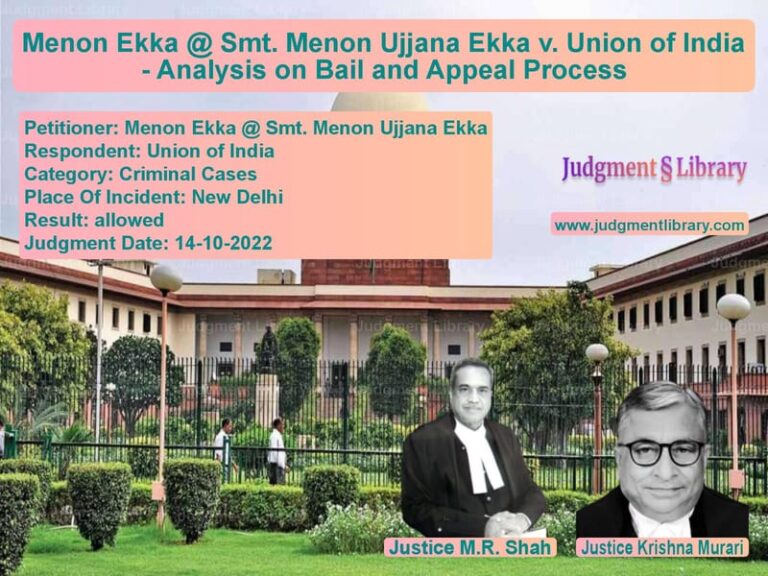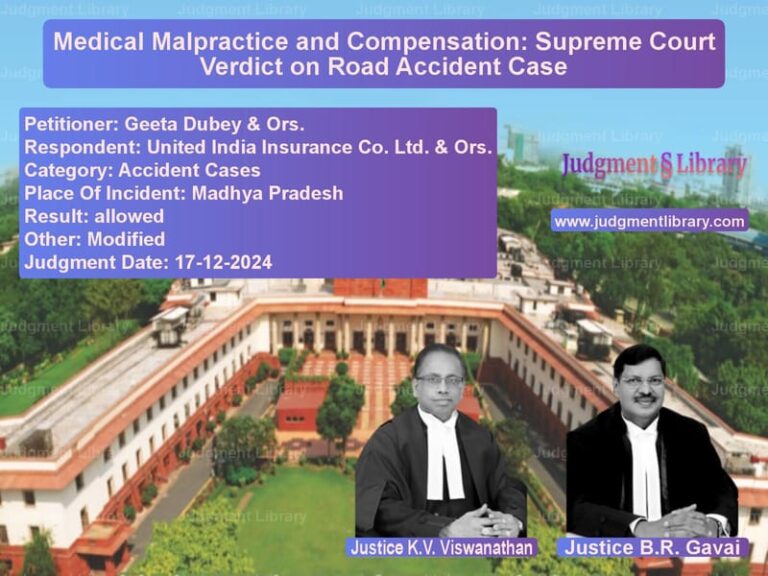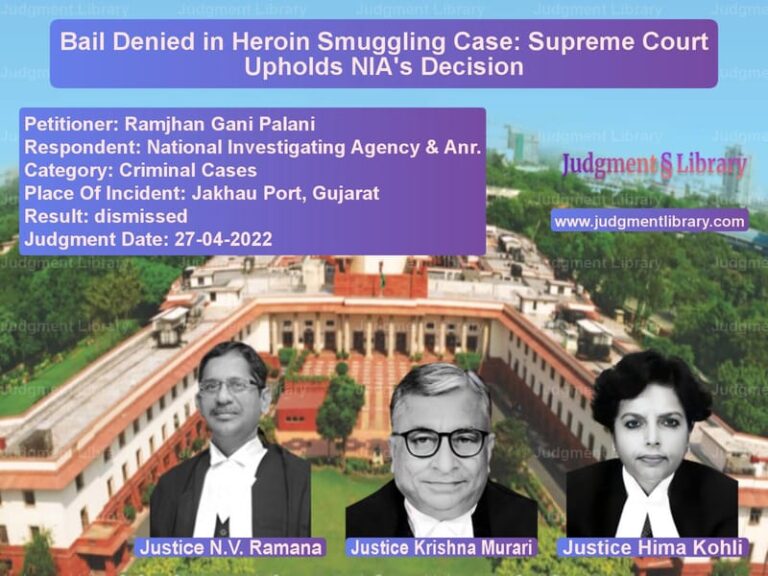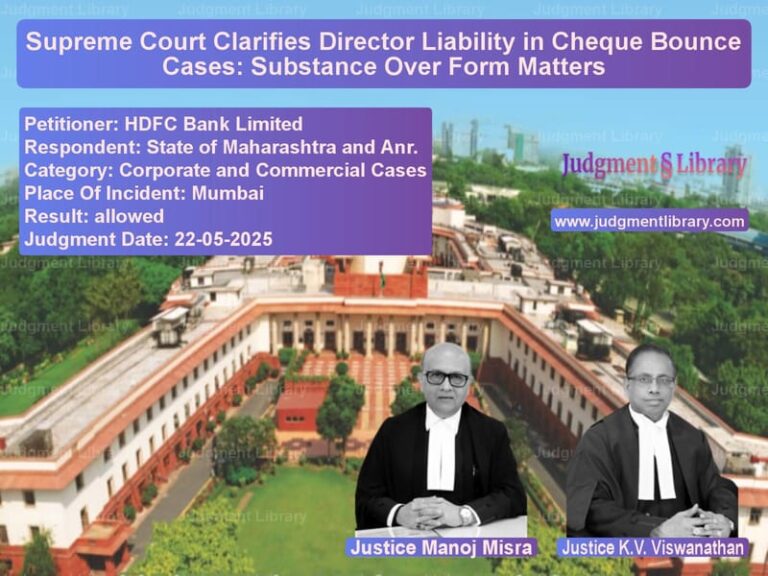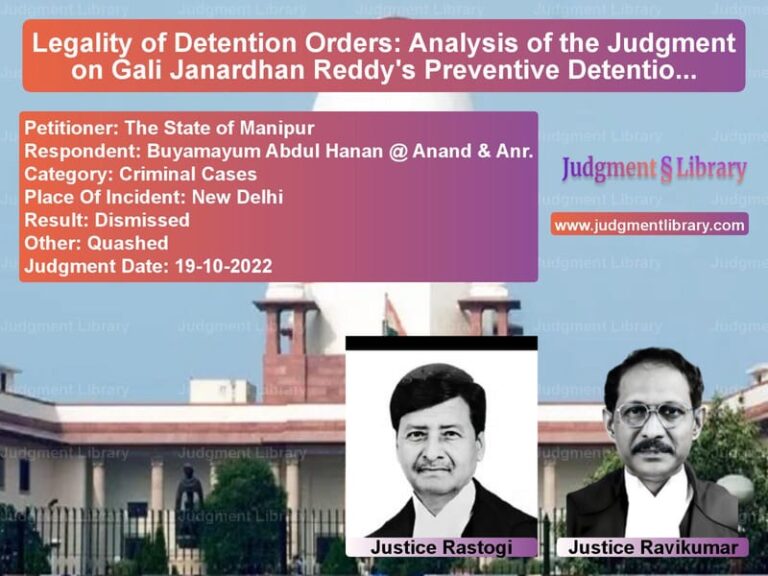Supreme Court Rejects Quashing of FIR in Salary Fraud Case Involving Government Employee
The Supreme Court of India recently delivered a landmark ruling in the case of State of Haryana v. Dr. Ritu Singh & Anr., addressing the quashing of an FIR involving serious allegations of salary fraud and misuse of government funds. The Court overturned the Punjab and Haryana High Court’s decision, which had quashed the FIR based on a compromise between the complainant and the accused. This judgment reaffirms the principle that criminal offenses against the State cannot be settled privately between individuals, ensuring that cases of corruption and fraud undergo due legal scrutiny.
The ruling has far-reaching implications for cases involving financial misconduct by public servants and the manner in which courts assess the quashing of criminal proceedings. The judgment reinforces the accountability of government officials and prevents the misuse of judicial discretion to shield accused individuals from prosecution.
Background of the Case
The case originated from an FIR registered against Dr. Ritu Singh, a veterinary doctor in the Animal Husbandry Department in Sonipat, Haryana. The complaint, filed by a private citizen, alleged that she had engaged in fraudulent practices during her tenure:
Read also: https://judgmentlibrary.com/supreme-court-acquits-man-in-alleged-rape-case-citing-lack-of-evidence/
- Undertook multiple foreign trips without obtaining official permission.
- Falsely marked her presence at her workplace while she was abroad.
- Submitted forged medical certificates to claim salary for periods during which she was not working.
- Caused financial loss to the government treasury by withdrawing salary for unauthorized absences.
The complainant, Satish Saroha, filed a complaint based on information obtained under the Right to Information (RTI) Act, which led to the registration of the FIR. The allegations pointed toward a broader issue of corruption within the department, necessitating an investigation.
Legal Proceedings and High Court Decision
Following the FIR, Dr. Ritu Singh moved the Punjab and Haryana High Court, seeking quashing of the FIR on the grounds that she had reached a settlement with the complainant. The High Court accepted her plea and quashed the FIR, disregarding the objections raised by the State, which had opposed the quashing on the ground that the offense involved public funds and could not be settled privately.
The State of Haryana, dissatisfied with the High Court’s ruling, appealed to the Supreme Court, arguing that the quashing of the FIR was legally flawed and that corruption cases involving government employees required proper investigation.
Petitioner’s Arguments
The State of Haryana, challenging the High Court’s decision, presented the following arguments before the Supreme Court:
- The offense was against the State: The allegations involved fraudulent withdrawal of salary from the government treasury, making it a matter of public interest rather than a private dispute between two individuals.
- Quashing the FIR halted a legitimate investigation: The High Court ignored the fact that the police investigation was still ongoing at the time of quashing, effectively preventing authorities from collecting crucial evidence.
- The complainant had no authority to settle the matter: The alleged fraud was against the State, and private compromise could not override public interest.
- Serious implications for corruption cases: Allowing such FIRs to be quashed based on private settlements could set a dangerous precedent, enabling corrupt officials to escape prosecution through backdoor compromises.
Respondent’s Arguments
Dr. Ritu Singh’s counsel defended the High Court’s decision, contending:
- The complainant lacked locus standi: The complainant was a private individual who had no direct stake in the matter.
- The FIR was motivated by personal vendetta: The complaint was allegedly filed with an intent to harass the accused rather than in the interest of justice.
- She was exonerated in departmental proceedings: The department had already cleared her of wrongdoing in internal inquiries, making further criminal proceedings redundant.
- Continuing the case would be an abuse of process: Since the complainant had voluntarily agreed to settle, the matter should not have been pursued further.
Supreme Court’s Observations
The Supreme Court carefully examined the High Court’s decision and found it legally untenable. The Court’s key observations included:
- Crimes against the State cannot be settled privately: The alleged fraud involved government funds, making it a public offense rather than a private dispute that could be quashed through compromise.
- Investigation must not be obstructed: The Court emphasized that allowing the FIR to be quashed at an early stage deprived law enforcement agencies of the opportunity to conduct a thorough investigation.
- Departmental clearance does not negate criminal liability: While internal disciplinary proceedings may have exonerated the accused, such proceedings operate independently of criminal investigations.
Key Judicial Remarks
The Supreme Court, in its judgment, made several crucial observations:
“The allegations against the accused are of defrauding the State. How can such a matter be settled on the basis of a ‘compromise’ between two private individuals? The simple answer is that it cannot be done.”
On the role of the complainant, the Court noted:
“A perusal of the contents of the FIR would show that it was not the complainant who was the victim… The victim was not the complainant but the State.”
Final Judgment
The Supreme Court ruled:
- The High Court’s order quashing the FIR was set aside.
- The FIR against Dr. Ritu Singh was reinstated, allowing the investigation to proceed.
- The compromise between the complainant and the accused was deemed legally irrelevant.
- The accused retains the right to present her defense at an appropriate stage.
Conclusion
The Supreme Court’s ruling sets a crucial precedent in cases involving financial misconduct by government employees. It reinforces the principle that crimes involving public funds cannot be privately settled and must be subjected to proper legal scrutiny. The judgment ensures that corruption cases are not dismissed prematurely and upholds the integrity of the judicial process in handling offenses against the State.
Read also: https://judgmentlibrary.com/cbi-vs-r-c-sabharwal-supreme-court-rejects-discharge-in-corruption-case/
Petitioner Name: State of Haryana.Respondent Name: Dr. Ritu Singh & Anr..Judgment By: Justice Sudhanshu Dhulia, Justice Rajesh Bindal.Place Of Incident: Sonipat, Haryana, India.Judgment Date: 22-03-2024.
Don’t miss out on the full details! Download the complete judgment in PDF format below and gain valuable insights instantly!
Download Judgment: state-of-haryana-vs-dr.-ritu-singh-&-anr-supreme-court-of-india-judgment-dated-22-03-2024.pdf
Directly Download Judgment: Directly download this Judgment
See all petitions in Fraud and Forgery
See all petitions in Public Interest Litigation
See all petitions in Legal Malpractice
See all petitions in Judgment by Sudhanshu Dhulia
See all petitions in Judgment by Rajesh Bindal
See all petitions in allowed
See all petitions in Quashed
See all petitions in supreme court of India judgments March 2024
See all petitions in 2024 judgments
See all posts in Criminal Cases Category
See all allowed petitions in Criminal Cases Category
See all Dismissed petitions in Criminal Cases Category
See all partially allowed petitions in Criminal Cases Category



